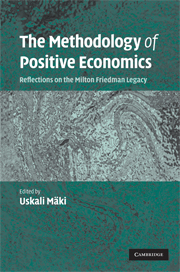Book contents
- Frontmatter
- Contents
- List of figures
- List of tables
- Contributors
- Preface
- Part 1 The classical essay in twentieth-century economic methodology
- Part 2 Reading and writing a classic
- Part 3 Models, assumptions, predictions, evidence
- 4 The influence of Friedman's methodological essay
- 5 Did Milton Friedman's positive methodology license the formalist revolution?
- 6 Appraisal of evidence in economic methodology
- 7 The politics of positivism: disinterested predictions from interested agents
- Part 4 Theoretical context: firm, money, expected utility, Walras and Marshall
- Part 5 Concluding perspectives
- Index
5 - Did Milton Friedman's positive methodology license the formalist revolution?
Published online by Cambridge University Press: 02 December 2009
- Frontmatter
- Contents
- List of figures
- List of tables
- Contributors
- Preface
- Part 1 The classical essay in twentieth-century economic methodology
- Part 2 Reading and writing a classic
- Part 3 Models, assumptions, predictions, evidence
- 4 The influence of Friedman's methodological essay
- 5 Did Milton Friedman's positive methodology license the formalist revolution?
- 6 Appraisal of evidence in economic methodology
- 7 The politics of positivism: disinterested predictions from interested agents
- Part 4 Theoretical context: firm, money, expected utility, Walras and Marshall
- Part 5 Concluding perspectives
- Index
Summary
A man who has a burning interest in pressing issues of public policy, who has a strong desire to learn how the economic system really works in order that that knowledge may be used, is not likely to stay within the bounds of a method of analysis that denies him the knowledge he seeks. He will escape the shackles of formalism, …A far better way is to try to derive theoretical generalizations to fit as full and comprehensive set of related facts about the real world as it is possible to get.
(Friedman 1946, 631)Introduction
Milton Friedman's 1953 paper “The methodology of positive economics’ (hereafter F53) is clearly the best-known and most cited work in twentieth-century economic methodology. F53 often exhausts the practicing economist's exposure to the methodological literature. As the philosopher Daniel Hausman put it: “It is the only essay on methodology that a large number, perhaps a majority, of economists have ever read’ (Hausman 1992, 162).
There is a vast methodological literature surrounding F53, but this chapter will not approach the essay from the perspective of any of these familiar methodological positions. For example, what follows will not: (1) summarize Friedman's argument in any detail; (2) try to situate Friedman's essay within the existing philosophical, particularly philosophy of science, literature; (3) make the case for a particular interpretation of key words like “assumptions,” “realism,” “prediction,” etc;(4) try to reconcile (or critique) the relationship between Friedman's methodological advice and his actual scientific practice; (5) evaluate the adequacy of Friedman's stated methodology as an economic methodology. What follows is broadly concerned with F53, but it will not address any of the traditional methodological questions associated with Friedman's famous essay.
- Type
- Chapter
- Information
- The Methodology of Positive EconomicsReflections on the Milton Friedman Legacy, pp. 143 - 164Publisher: Cambridge University PressPrint publication year: 2009
- 5
- Cited by



